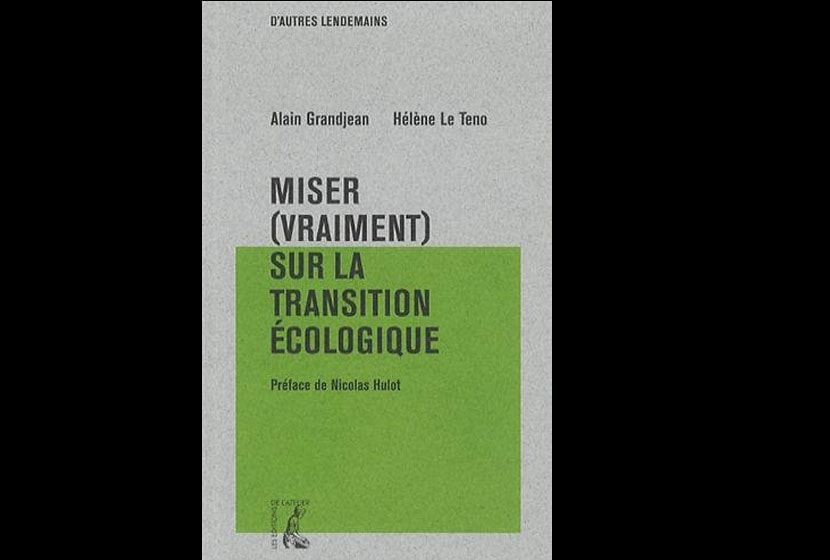The IPCC (1) published the third part of its report last month (April 13, 2014), this time dedicated to mitigating global warming. Jean-Charles Hourcade, an economist at the International Center for Research on Environment and Development, takes stock of the necessary economic transition the world must now tackle.
Following the publication of the Group I and Group II reports, devoted respectively to the physical basis of climate change and to adaptation and vulnerability to climate change, the Intergovernmental Panel on Climate Change (IPCC) has just published the Group III report. What is its role?
Jean-Charles Hourcade This group focuses on so-called mitigation measures, i.e. measures to reduce greenhouse gas emissions. Its work consists in assessing the associated economic stakes, essentially the impact on growth. This is done while taking into account technological margins for manoeuvre and ethical aspects such as solidarity or equity between countries according to their level of development, but also between generations. In fact, it is essential to consider the breakdown of the cost (process of distributing a sum among different items, groups or individuals) the necessary energy transition. It is also important to note that the Group's aim is neither to predict nor to prescribe, but to provide a better understanding of the mechanisms at play. The future of energy depends on the choices societies make: whether or not to phase out nuclear power, introduce a carbon tax, combat urban sprawl, and so on. Our mandate is neither to predict what they will do, nor to advise them on what they should do.
This new report follows on from three others, published in 1995, 2001 and 2007. What's new about it?
J.-C. H. When it comes to economics, we can't expect any real breakthroughs, just a better description and understanding of the mechanisms involved. The sectoral chapters dealing respectively with energy, transport, construction, industry and agriculture/forestry have therefore been enriched. And we have included urban and spatial dynamics in our analyses, underlining that ambitious climate policies cannot be reduced to energy policies alone.
But the real novelty has been to put the question of the link between climate and development back at the center, with two dedicated chapters in particular. In addition, we present an analysis of the possibilities for stabilizing warming at different temperature levels, including the 2°C target. Compared with the 2001 report, this focus on the long term, which corresponds to a strong political and media demand, has meant that the report contains fewer figures on the initiation of the transition, and on short-term impacts on growth and employment. Fortunately, this is balanced by the appearance of chapters on development.

The Brazilian city of Curitiba is known as a model city in terms of transport and the environment. In recent years, however, it has been caught up in the problems affecting other Brazilian metropolises. ©CNRS Photothèque / H. THERY
So, is the 2°C target tenable?
J.-C. H. : Based on some fifteen different global models that have produced hundreds of scenarios on how different possible economic trajectories affect climate change, the report shows that stabilization of greenhouse gas (GHG) concentrations in the atmosphere below 450 ppm (the threshold beyond which warming will exceed 2°C) can be achieved in 60 % of cases. However, this implies strong and immediate action, in most cases a temporary overshoot of 2°C and, from 2070-2080 onwards, carbon sequestration to more than offset emissions, i.e. to lower the level of CO2 in the atmosphere.
So it's a very difficult goal to reach?
J.-C. H. I'll let the reader be the judge! On a more serious note, formulated in this way, the question reduces climate policies to the implementation of a constraint on the economy. This is why the new report focuses on the links between climate objectives and the general issue of development.
From this perspective, climate policies become opportunities that have a positive impact on the content and sustainability of development. In other words, if we make the climate a challenge that calls into question our mode of development, we realize that there is room for maneuver that will enable us to protect the climate while helping to strengthen our economies and enable a rapid transition. This does not guarantee that we will be able to reach the 2°C target.
Nevertheless, it is possible to take steps to avoid rapidly irreversible drifts, given the speed with which developing countries are building their infrastructures. If we launch a virtuous circle between climate protection and the environment, we'll release such potential for technical and institutional innovation that we may ultimately be able to meet the 2°C target without resorting to highly uncertain large-scale carbon sequestration.
Can you give some concrete examples of how climate objectives and development can be linked?
J.-C. H. Take the air pollution caused by oil and gas combustion. The IPCC report clearly shows that it is responsible for significant costs to health and agricultural productivity (particularly in China and India), and that reducing GHG emissions would yield a co-benefit of around 0.6 % of GDP. Reducing greenhouse gas emissions would therefore benefit both the climate and the country's economy. Similarly, by reducing our dependence on oil and gas in favor of less carbon-intensive energies, we would reduce the fluctuations in fossil fuel prices, an instability that has a negative economic impact and, above all, the geopolitical tensions that marked the last quarter of the 20th century. There's also the better use of local energy resources and access to better-quality housing.
 Reducing greenhouse gas emissions would also reduce the pollution affecting many cities (here, Hong Kong) and regions of the world. But pollution has a huge cost, particularly in terms of public health. Stripped Pixel - Fotolia.com
Reducing greenhouse gas emissions would also reduce the pollution affecting many cities (here, Hong Kong) and regions of the world. But pollution has a huge cost, particularly in terms of public health. Stripped Pixel - Fotolia.com
Is there an overall figure for the cost of the transition required to achieve the climate objective?
J.-C. H. : There are as many costs as there are assumptions about technologies or the effectiveness of policies implemented. The important point is that analyses show that, cumulated over the century, the macroeconomic cost of the transition does not exceed 4 % of world GDP, or roughly one year's growth delay. The message is this: the climate imperative in no way condemns us to degrowth. On the other hand, we need to pay close attention to the distribution of these losses over time. In some cases, short-term losses can be substantial, effectively prohibiting transition. This brings us back to the issue of climate and development.
Why does the "low-carbon" transition require better consideration of urban dynamics and regional planning?
J.-C. H. : Of course, we have to rely on technical progress in all areas: energy, transport, buildings, industry, agriculture and forestry. But technology alone is not enough, because the energy gains we make are often not enough to offset the growth in consumption. The transport sector is a case in point: engines consume less and less, but the demand for mobility only increases; similarly, the just-in-time nature of industrial production and the large-scale marketing networks for agricultural products means that the growth in goods transport outstrips that of total output. In practical terms, the transition we need to make cannot do without thinking beyond the price of carbon. Although important, the price of carbon will be powerless to control dynamics fuelled by real estate prices, land prices and various urban planning mechanisms.
Nevertheless, economic and financial tools are very important in supporting change?
J.-C. H. Of course. And on this point, it is now clear that what already exists is not enough, and understanding the failure in various countries, including our own, to explain what a carbon tax could be deserves to mobilize the social sciences. Similarly, the financial aspects of climate change cannot be reduced to markets for tradable emissions permits. A new point, highlighted by the IPCC's summary for decision-makers, is the difference between accounting for carbon emissions by geographical location and by place of consumption. In the latter case, we incorporate the emissions of the products you import (and deduct those of the products you export). In other words, if you eat Brazilian chicken in France, you are co-responsible for the emissions associated with raising this poultry. However, while emissions from developing countries have risen considerably in recent years, the result is markedly different if we consider the emissions incorporated into consumption. This raises the question of the use of economic instruments, such as the design of taxes or the role of sectoral industrial cooperation agreements.
However, particularly since the financial and economic crisis of 2008, the climate issue seems to have taken a back seat?
J.-C. H. We're living in a paradoxical moment. On the one hand, we are no longer innocent about the need for an economic transition to meet the climate challenge, and our understanding of the mechanisms involved is now mature. On the other hand, as shown by the multiplication of tensions and conflicts, global governance is increasingly chaotic, making it more difficult to get the transition off the ground. So, we have no choice but to make this necessary transformation of our economy attractive, in order to initiate a new virtuous circle strong enough to appear credible. The fight against climate change is not a punishment, but a lever for rethinking our world and, for example, inventing a climate finance system that diverts the world's overabundant savings from speculative investments to "low-carbon" infrastructures and pulls the global economy out of its languor. We have between ten and twenty years ahead of us to tackle the problem head-on. Beyond that, too much investment in infrastructure, particularly in developing countries, will have distanced us from a trajectory that takes climate issues into account. By then, it will be too late.
Mathieu Grousson - CNRS Journal - April 2014
(1) The Intergovernmental Panel on Climate Change is an international body responsible for assessing the science of climate change. It was established in 1988 by the World Meteorological Organization and the United Nations Environment Programme to provide decision-makers with regular assessments of the scientific basis for climate change. climate change, associated impacts and risks, and opportunities for adaptation and mitigation.












